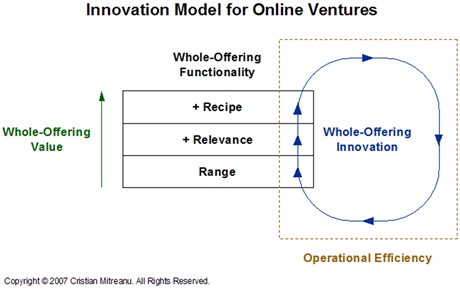The day just ended, and you can't stop thinking about the cool new feature that may improve your online venture. Basic questions keep popping up. Is it going to bring more visitors? Is it going to improve their experience? How much is it going to cost? And then, you recall that only two days ago you were dealing with the same dilemma. Different feature, though.
Sound familiar?
Today, opportunities to improve an online venture abound, making it increasingly difficult to spot the right ones. Fortunately, most Internet-based ventures are fundamentally similar—they process, manage, and distribute information. Articles, books, pictures, songs, videos—they are all information. Therefore, it is possible to develop a unique framework that can guide all innovation efforts that an online venture must sustain.
Since the information or packages of information distributed (offered) by an online venture lose their premium value almost instantly, it is rather impossible to innovate at the offering level. Therefore, an online venture must innovate at the whole-offering level.
And by whole-offering I mean all of a venture's offerings plus the mechanism by which they are managed and delivered to the customer ("customer" is a generic term for visitor, community member, or whoever consumes the information offerings).
Although, in many cases, it is the main revenue generator, the advertising side of an online venture is fully dependent on the information side. More so, it addresses a different set of customers. Therefore, the whole-offering does not include advertising offerings; just information offerings.
Most online ventures have just one whole-offering. In these cases, the whole-offering can be identified with the venture. Some examples of whole-offerings include book distribution (Amazon.com), search engine (Google), encyclopedia (Wikipedia), video distribution (YouTube), and photo distribution (Flickr).
The logic behind the innovation model is relatively simple. On one side, there are the customers, who need information to better their existence. Fundamentally, people follow three steps when employing information: search through the available information, gather relevant information, and then aggregate the relevant information according to a particular knowledge or algorithm in order to address an issue (e.g., entertainment, education).
On the other side, there is the online venture, which needs to process high quantities of a few types of information offerings, and then deliver them through one or more mechanisms (one type of offering may require a unique mechanism) to the customers. All I had to do was find a way to bring these two sides together. So, here's the result:

Whole-Offering = all of an online venture's information offerings (text, photo, video, music) + the mechanism (Web-based application) used to process, manage, and distribute them to the customers.
Whole-Offering Functionality = a whole-offering's hierarchical levels of functionality (range >>> range+relevance >>> range+relevance+recipe), determined by the fundamental way in which customers employ information.
Range = the amount of information offerings that the whole-offering is capable of reaching.
Relevance = the actual relevance (to the customer) of the relevant information generated by the whole-offering.
Recipe = the degree to which the whole-offering's algorithm for aggregating the relevant information comes close to the algorithm that the customer would use in order to generate a solution to one of its issues (e.g., entertainment, education).
Whole-Offering Value = the level of importance of the customer issue that the whole-offering addresses.
Whole-Offering Innovation = an improvement of the whole-offering's value, achieved through the improvement of its functionality along the hierarchy mentioned above. Note: While small, incremental improvements may occur with a higher frequency, more significant improvements tend to move slowly up the functionality hierarchy following the advancement of the Internet technological era.
Operational Efficiency = an online venture's capacity to generate and deliver its whole-offering(s) in the best possible manner with the least waste of resources. Note: While the lack of innovation can be detrimental over time, the lack of operational efficiency can immediately render your venture irrelevant. Therefore, operational efficiency must be a constant effort for any venture.
So, what is this model telling us? Does it work in the real world?
Well, for one, it explains the past. Since its introduction, the Internet has rapidly increased the range of most whole-offerings to incredible levels. This explains the meteoric rise of companies like Amazon.com and Google.
The model also explains the present. Recent technological developments have allowed online ventures to significantly increase the relevance of their offerings. The success of Wikipedia, MySpace, and other "Web 2.0" whole-offerings/businesses is a result of these advancements.
And, finally, the model also indicates what will probably happen in the future. In this Internet era, the innovation cycle gradually advances to reach the recipe level. This suggests that the future is bright for specialized communities (e.g., MarketingProfs.com, WebMD), which can reach the recipe level with enough range and relevance to ensure the critical mass of customers necessary for success.
However, that's not to say that the successful whole-offerings of today will disappear. They will most likely find a way to thrive in the new environment.
For example, Google will probably continue to excel at the range and relevance level. The acquisition of YouTube and other initiatives, like book scanning, point in that direction. And, if nothing else, this can make Google a strong platform candidate for other whole-offerings.
Amazon.com may run into difficulties because it sells mainly packaged information (books, CDs, DVDs), and customers most often want to access the pieces of information inside those packages. As a result, Amazon.com must, at a minimum, keep pace with other companies' "un-packaging" initiatives (e.g., Google's book scanning, Apple's iTunes digital music store).
Wikipedia too may have troubles advancing its whole-offering at the recipe level, because of its heavy reliance on unpaid volunteers.
In conclusion, to achieve enduring success, you must ensure that your online venture operates in a permanent state of operational efficiency, complemented by a continuous and cyclical process of innovation along the whole-offering's hierarchy of functionality.



